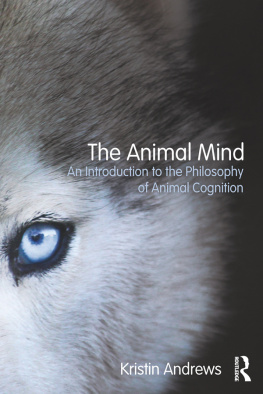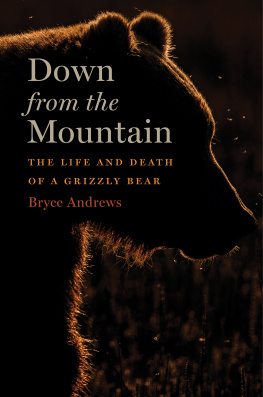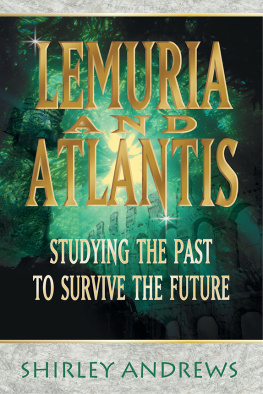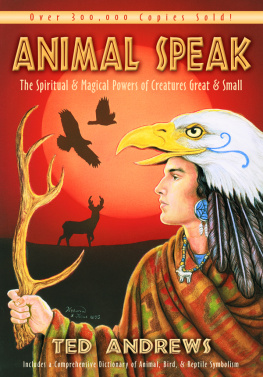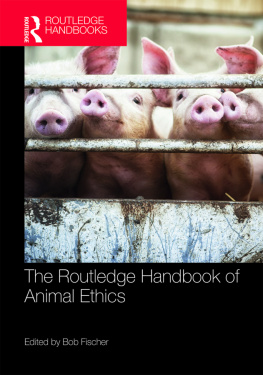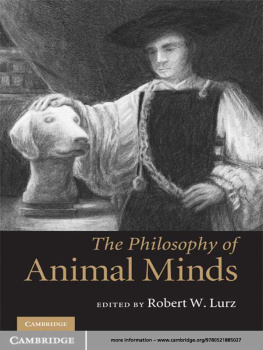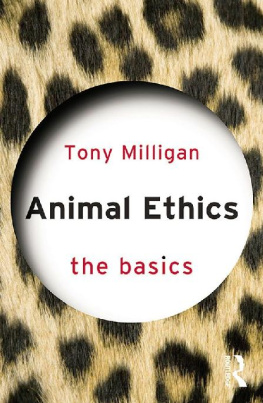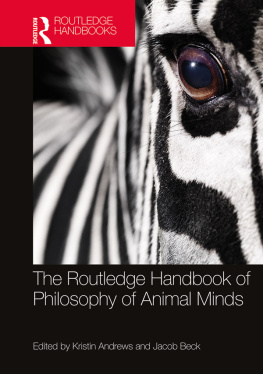Andrews - The animal mind: an introduction to the philosophy of animal cognition
Here you can read online Andrews - The animal mind: an introduction to the philosophy of animal cognition full text of the book (entire story) in english for free. Download pdf and epub, get meaning, cover and reviews about this ebook. City: London;New York;NY, year: 2015, publisher: Taylor and Francis;Routledge, genre: Religion. Description of the work, (preface) as well as reviews are available. Best literature library LitArk.com created for fans of good reading and offers a wide selection of genres:
Romance novel
Science fiction
Adventure
Detective
Science
History
Home and family
Prose
Art
Politics
Computer
Non-fiction
Religion
Business
Children
Humor
Choose a favorite category and find really read worthwhile books. Enjoy immersion in the world of imagination, feel the emotions of the characters or learn something new for yourself, make an fascinating discovery.
The animal mind: an introduction to the philosophy of animal cognition: summary, description and annotation
We offer to read an annotation, description, summary or preface (depends on what the author of the book "The animal mind: an introduction to the philosophy of animal cognition" wrote himself). If you haven't found the necessary information about the book — write in the comments, we will try to find it.
The animal mind: an introduction to the philosophy of animal cognition — read online for free the complete book (whole text) full work
Below is the text of the book, divided by pages. System saving the place of the last page read, allows you to conveniently read the book "The animal mind: an introduction to the philosophy of animal cognition" online for free, without having to search again every time where you left off. Put a bookmark, and you can go to the page where you finished reading at any time.
Font size:
Interval:
Bookmark:
The Animal Mind
The study of animal cognition raises profound questions about the minds of animals and philosophy of mind itself. Aristotle argued that humans are the only animal to laugh, but recent experiments suggest that rats laugh too. In other experiments, dogs have been shown to respond appropriately to over 200 words in human language.
In this introduction to the philosophy of animal minds Kristin Andrews introduces and assesses the essential topics, problems, and debates as they cut across animal cognition and philosophy of mind. She addresses the following key topics:
what is cognition, and what is it to have a mind? What questions should we ask to determine whether behavior has a cognitive basis?
the science of animal minds explained: Classical ethology, behaviorist psychology, and cognitive ethology
rationality in animals
animal consciousness: what does research into pain and the emotions reveal? What can empirical evidence about animal behavior tell us about philosophical theories of consciousness?
does animal cognition involve belief and concepts; do animals have a Language of Thought?
animal communication
other minds: do animals attribute mindedness to other creatures?
moral reasoning and ethical behaviour in animals
animal cognition and memory
Extensive use of empirical examples and case studies is made throughout the book. These include Cheney and Seyfarths vervet monkey research, Thorndikes cat puzzle boxes, Jensens research into humans and chimpanzees and the ultimatum game, Pankseep and Burgdorfs research on rat laughter, and Clayton and Emerys research on memory in scrub jays.
Additional features such as chapter summaries, annotated further reading, and a glossary make this an indispensable introduction to those teaching philosophy of mind and animal cognition. It will also be an excellent resource for those in fields such as ethology, biology, animal studies, and psychology.
Kristin Andrews is Associate Professor in the Department of Philosophy and Director of the Cognitive Science Program at York University, Canada. She is the author of Do Apes Read Minds? Toward a New Folk Psychology (2012), and co-editor of the forthcoming Routledge Handbook of Animal Cognition.
The Animal Mind
An Introduction to the Philosophy of Animal Cognition
Kristin Andrews

First published 2015
by Routledge
2 Park Square, Milton Park, Abingdon, Oxon OX14 4RN
Simultaneously published in the USA and Canada
by Routledge
711 Third Avenue, New York, NY 10017
Routledge is an imprint of the Taylor & Francis Group, an informa business
2015 Kristin Andrews
The right of Kristin Andrews to be identified as the author of this work has been asserted by her in accordance with sections 77 and 78 of the Copyright, Designs and Patents Act 1988.
All rights reserved. The purchase of this copyright material confers the right on the purchasing institution to photocopy pages which bear the photocopy icon and copyright line at the bottom of the page. No other parts of this book may be reprinted or reproduced or utilized in any form or by any electronic, mechanical, or other means, now known or hereafter invented, including photocopying and recording, or in any information storage or retrieval system, without permission in writing from the publishers.
Trademark notice: Product or corporate names may be trademarks or registered trademarks, and are used only for identification and explanation without intent to infringe.
British Library Cataloguing in Publication Data
A catalogue record for this book is available from the British Library
Library of Congress Cataloging in Publication Data
Andrews, Kristin, 1971
The animal mind : an introduction to the philosophy of animal cognition / Kristin Andrews.
pages cm
Includes bibliographical references and index.
1. Cognition in animals. 2. Animal behavior. 3. Cognition-Philosophy. I. Title.
QL785.A69 2015
591.513dc23
2014021202
ISBN13: 978-0-415-80957-3 (hbk)
ISBN13: 978-0-415-80960-3 (pbk)
ISBN13: 978-1-315-77189-2 (ebk)
Typeset in Franklin Gothic
by Saxon Graphics Ltd, Derby
Ive been teaching the Philosophy of Animal Minds at York University for over ten years, and Ive learned much about how to present this material from all the students who have passed through my classroom. Some of them read draft chapters of this book, some of them saw slides that I turned into text, but they all helped shape the book you are looking at now. First thanks to all of them.
I wasnt planning on turning my class into a textbook but one day Tony Bruce from Routledge showed up in my office and asked me to write The Animal Mind. It sounded like a great idea. During the next two years I was lucky enough to have lots of eyes on drafts. In particular, Id like to thank those who gave me comments on part or all of the manuscript: Laura Adams, Jacob Beck, Rachel Brown, Devin Curry, Grant Goodrich, Bryce Huebner, Brian Huss, Imola Ilyes, Georgia Mason, Irina Meketa, Edward Minar, Anne Russon, Sara Shettleworth, Elliott Sober, Olivia Sultanescu, and anonymous reviewers for Routledge. Id also like to thank members of the GTA Animal Cognition Group for helpful discussions about many of these issues. Olivia Sultanescu and Brian Huss deserve extra thanks for their work proofreading, and thank you Olivia for drafting the glossary, and for cleaning up and putting together the pieces that make up this book.
I am lucky to have had experiences working directly with animal cognition researchers. I have to thank Adam Pack and Lou Herman of the Kewalo Basin Marine Mammal Laboratory for accepting my application to work with the dolphins as an intern back in 1992. More recently I was given the opportunity to observe cognition research on rehabilitant orangutans by accepting an invitation to visit Samboja Lestari Reintroduction Project by the Borneo Orangutan Survival Foundation in Indonesia. I greatly thank BOS, and Anne Russon for facilitating the invitation. Seeing the differences between lab and field cognition research played an important part in how I now think about the best way to study animal minds.
Thanks to Brian and Poppy, and to Huxley and Mono, for putting up with me working on yet another book project, and all the time and distraction that goes along with that. Thanks to John and the crew at Annex Montessori for teaching Poppy while I worked, and to the cafs in Kensington Market and Bloordale for offering me good places to work. Much of this was written listening to The Smiths at Caf Pamenar and Ethiopian jazz at Holy Oak. Thanks to my faculty organization YUFA for giving me the course release needed to write, and thanks to SSHRC for funding the materials and support I needed to put it all together.
I also want to thank all the animals who were used in the research discussed in this book. Many of these individuals died in captivity, including some I had personal relationships with. I appreciate their forced sacrifice.
Rico, get the tyrex. Rico ambles into the next room, picks up the blue dinosaur from among a jumble of stuffed toys, and carries it back with him. Rico, get the ball the Santa Claus the sock, the white bunny Again, and again, Rico leaves the room, and returns with the named object. Ricos performance would be pretty good for a small child. For a border collie, it is astounding.
Rico has been taught 200 labels by his owners, who show Rico a new objectsay, a rubber chickenand then repeat the name of the objectchicken, chicken, chickentwo or three times. Then Rico gets to play with the toy, and not before long he is able to retrieve the chicken from his collection of objects when asked. In a formal study of Ricos word learning ability, researchers found that Rico can also fast map new words via a learning-by-exclusion mechanismhe is able to deduce the referent of an unfamiliar word by realizing, for example, that the word has to refer to one of eight objects, and that it cant refer to the seven familiar objects. So, if Rico is asked to retrieve the dax, and the other objects are the familiar ball, Santa Claus, sock, white bunny, etc., he is able to infer that the unfamiliar object must be the dax. In a video of this test that is posted online, you can see Rico nosing the various objects in the room before finally choosing the correct one (Kaminski et al. 2004).
Next pageFont size:
Interval:
Bookmark:
Similar books «The animal mind: an introduction to the philosophy of animal cognition»
Look at similar books to The animal mind: an introduction to the philosophy of animal cognition. We have selected literature similar in name and meaning in the hope of providing readers with more options to find new, interesting, not yet read works.
Discussion, reviews of the book The animal mind: an introduction to the philosophy of animal cognition and just readers' own opinions. Leave your comments, write what you think about the work, its meaning or the main characters. Specify what exactly you liked and what you didn't like, and why you think so.

